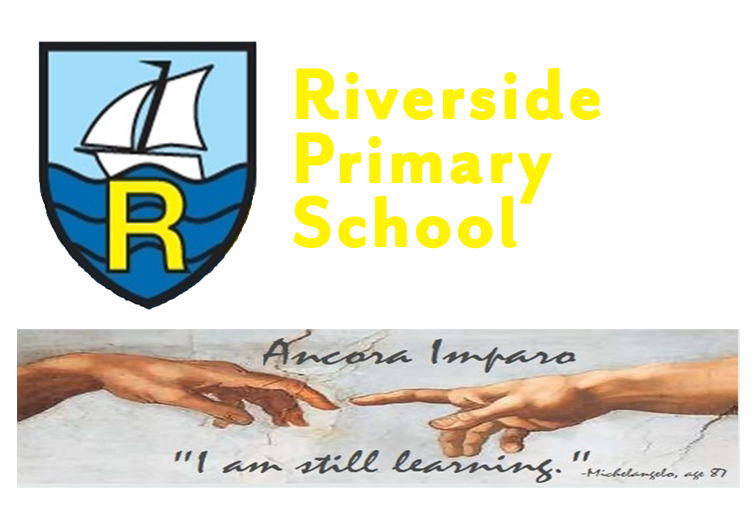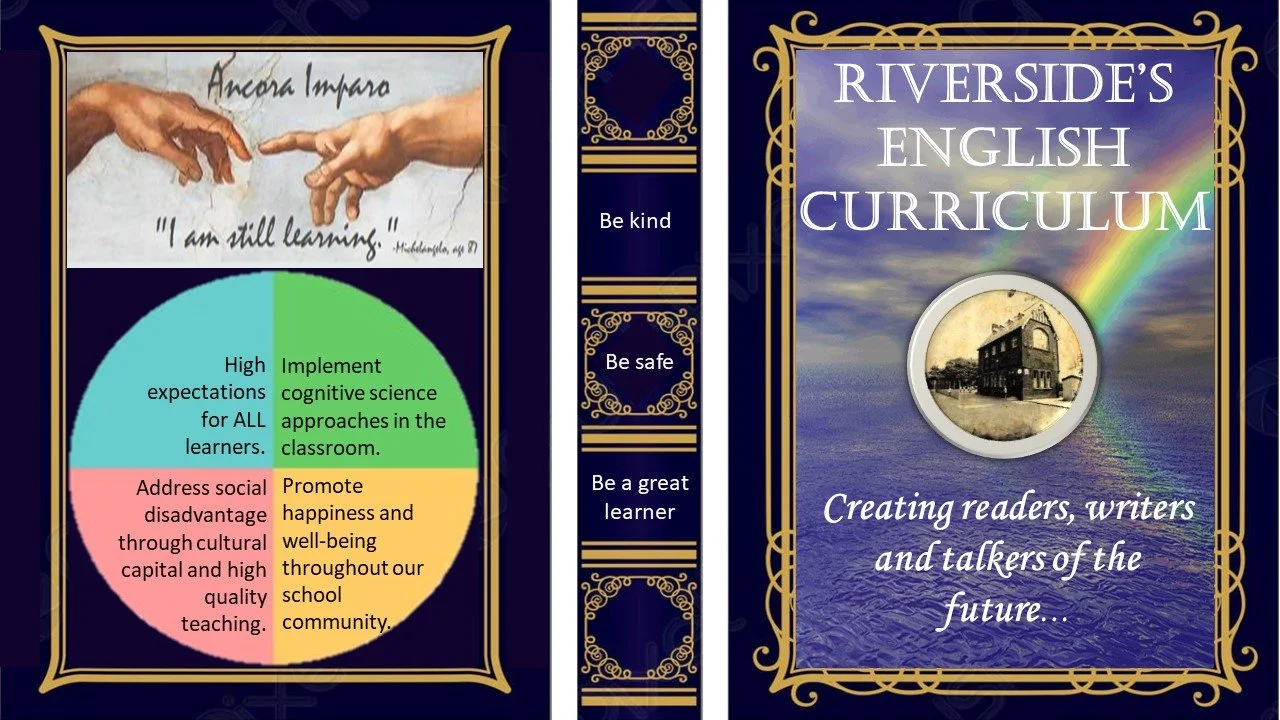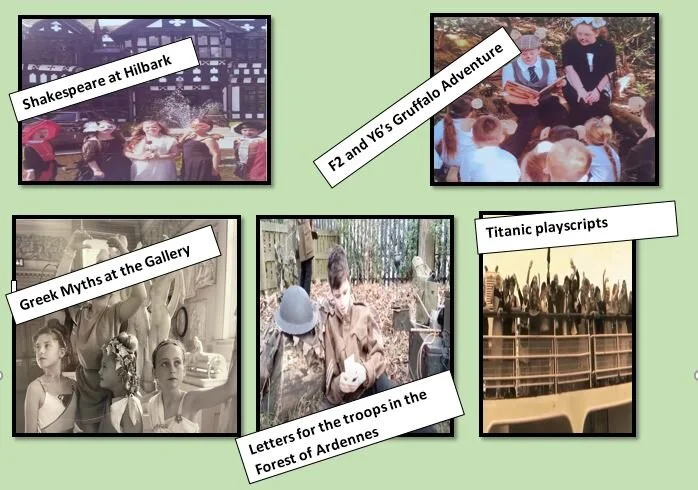English
Intent - Creating readers, writers and talkers of the future
Riverside’s commitment to creating a curriculum which promotes a love of language and literature ensures that our children will have the opportunity to,’develop culturally, emotionally, intellectually, socially and spiritually’(National Curriculum)
The national curriculum for English aims to ensure that all pupils:
read easily, fluently and with good understanding
develop the habit of reading widely and often, both for pleasure and information
acquire a wide vocabulary, an understanding of grammar and knowledge of linguistic conventions for reading, writing and spoken language
appreciate our rich and varied literary heritage
write clearly, accurately and coherently, adapting their language and style in and for a range of contexts, purposes and audiences
use discussion in order to learn; they should be able to elaborate and explain clearly their understanding and ideas are competent in the arts of speaking and listening, making formal presentations, demonstrating to others and participating in debate
Speaking and Listening
The development of vocabulary is at the heart of the English curriculum and we provide opportunities to create a vocabulary rich environment. Drama opportunities, school trips and first- hand experiences bring learning to life and make it meaningful and memorable for the pupils. Working walls are used to record and reinforce new vocabulary the children encounter.
Our creative curriculum has led to us being crowned winners of the prestigious Educate Award for, ‘Outstanding Arts in A Primary School for the last three years and to us being short-listed for the TES Award for,’ Creative School of the Year 2019 and 2020’. Our children headlined The Wirral Curriculum Conference and our senior leaders led workshops for the event. Our strong links with Liverpool Hope University have led to aspirational visits for our more able children and both staff and children have led seminars and lectures for the teachers of the future sharing our learning about our creative curriculum and cultural capital.
At Riverside, we invest heavily in speech and language therapy, through the company ‘Talk About Town’ who deliver 1:1 sessions with pupils with an identified need in this area. By providing a specific target for each pupil which is regularly reviewed progress is ensured. Engagement with parents in the process through regular reports and meetings also benefits the pupils’ progress. In addition to this, the therapist’s assessment of the children for their social communication skills has also allowed progress along the ASC pathway more rapidly, ensuring children’s specific needs are identified and met sooner.
By investing in Read to Write and Steps to Read, our English curriculum prepares pupils to communicate effectively and confidently with others. Learners are given opportunities to express their views and opinions. They develop their skills at participating effectively in cross-curricular group discussions, role-play and hot seating. The teaching styles utilised through the RWI programme also enable the children to practise their speaking and listening skills through partner work.
Additional programmes such as Early Talk Boost and Talk Boost also support children in the Foundation Stage with weaker communication skills.
We use Word Aware as our structured whole school approach to promote vocabulary development of all our children from Early Years to Year 6.
From the spring term, we have started our Voice 21 project to improve our children’s language acquisition using explicit oracy strategies.
Riverside extended its provision to two year olds in January 2022. We believe this has had a huge impact on improving outcomes for the future children of our school. Research shows that more than any other development, language development reflects the growth and maturation of the brain. The impact of offering our youngest children high quality learning experiences with a teacher will be far reaching.
The Education Endowment Fund (EEF) sites, ‘Indeed, we have shown that low vocabulary skills at school entry is associated not only with adult literacy at 34 years but also mental health and employability (Law, Rush, Parsons and Schoon,)’
Reading
‘Developing a love of reading can be more important for a child’s educational success than their family’s socio-economic background.’ Organisation for Economic Co-operation and Development (OECD) 2002
The latest DFE’s latest framework on reading, states that it is, ‘the key to unlocking the rest of the academic curriculum’ (July 2021), at Riverside, we are committed to making every child a highly engaged reader.
Early reading is taught through Read, Write Inc. (RWI) from Foundation One until Year Two.
In Y2, once the pupils have completed the RWI programme, they progress to the RWI comprehension modules.
In KS2, pupils access ‘Steps to Read’ as a shared and group reading experience. This provides a clear teaching sequence that explicity teaches reading skills and strategies in a cumulative way through evidence based approaches. In addition, we use the Complete Comprehension scheme from Years 3 - 6 which combines a skill based approach with explicit vocabulary instruction.
When children in KS1 can read independently, they are enrolled on the Accelerated Reader programme. All KS2 pupils access this programme, which tracks pupils’ individual reading. MyON is used as an online tool, allowing access to a wealth of reading materials in school and whilst pupils are at home. Reading books go home from the children’s first day at school. In addition, the children enjoy daily stories and poems read to them. Each classroom has a reading area were the children can enjoy books throughout the day. The children have opportunities to recite poems and rhymes, which are shared and celebrated in assemblies.
There are also opportunities for the children to visit Seacombe Library and meet with local authors. They are encouraged to take part in the summer challenges. We participate in reading events throughout the year including Book Fairs and World Book Days.
Phonic assessment The children are assessed and grouped according to their ability. They work in small groups with a teacher and a teaching assistant. At the end of each half term the children will be assessed again to check they have made progress and will be grouped again.
Statutory phonics screening Statutory phonics screening takes place in the summer term of Year One. Pupils in Year Two who did not meet the expected standard whilst in Year One also re-sit the test. Click here for the RWI page.
PIRA assessments At the end of every term, pupils undertake a reading comprehension and SPaG assessment, which provide a standardised score, and allows comparisons between children of the same age nationally.
Star reader Every term pupils in KS2 take a ‘Star Reader’ test, which provides a reading, standardised score and a Zone of Proximal Development (ZPD), which gives the recommended reading range for that child.
Accelerated Reader Once a child has completed a reading test they are assessed on their comprehension of the text by taking a quiz based on the book. If a child receives, 85% or more they pass the quiz. Based on the child’s score, teachers will recommend whether to stay on that level for consolidation, or move further up the ZPD range. Each term the children are assessed using Rising Stars assessment.
Key words Pupils are assessed on their ability to read the common exception words once per half term.
Young people who enjoy reading very much are nearly five times as likely to read above the expected level for their age.'
Children's and Young People's Today, National Literacy Trust, 2012
Writing
Writing begins in the Seedlings with a focus on the gross motor movement of the joints of the arm and includes daily malleable materials to develop finger dexterity.
This progresses into the Acorns with a greater focus on fine motor skills including line dancing pencil disco to mark make with increasing control and purpose.
Children in F2 practise building sentences using vocabulary through our carefully chosen stories. Children rehearse stories orally in preparation for writing. During daily phonics lessons, the children hold a sentence, spell words and practise writing dictated sentences, which will lead to them progressing on to short compositions, based on the books children have read and enjoyed.
To ensure the full curriculum coverage, we have used Literacy Counts ‘Read to Write’ scheme for writing. This framework ensures progression of skills and knowledge across all year groups, from Year 2 to Year 6. In addition to this, we seek out exciting writing opportunities linked to history and other cultural events and themes.
Assessment
Teachers assess pupils’ writing on a daily basis and record this through whole class feedback sheets. These sheets include whole class misconceptions, common errors and next steps for the class. Pupils are encouraged to edit their work themselves as well as using peer assessment to improve their writing. Once a week, the children have a free write session to build writing stamina. Every half term, the children produce a piece of work in their ‘Writing Odyssey’ book, which is assessed formally against the expected standards for their year group. Careful planning ensures that a range of writing genres are covered and that all writing standards have been addressed throughout the year.
Grammar
Grammar is taught explicitly through ‘No Nonsense Grammar’ and in context through ‘Read to Write’. In KS1, there are additional opportunities through RWI sessions.
Assessment -At the end of every term children undertake a SPaG assessment
Click here for Vocabulary, Grammar and Punctuation National Curriculum Overviews for Year 1- Year 6.
Links below for English Curriculum Overviews show which aspects of Grammar and Spelling are being taught for each year group.
Spelling
Spelling is taught systematically through the ‘No Nonsense Spelling’ programme.
Assessment – spellings are assessed continuously. As well as daily spelling lessons, the teaching of spelling is continuous. Opportunities are planned within shared reading, handwriting practice and writing sessions afford many opportunities for talking about spelling and revisiting and practising strategies. Children are encouraged to use dictionaries and working walls to self-assess and check their own spelling within their written work. The spelling of the common exception words is assessed every half term. Pupils are given seven words to learn per week, linked to a particular spelling pattern. These are practised in a variety of ways throughout the week, and then tested on a Friday.
Click here for Tips to learning spellings at home
Handwriting
Handwriting is taught through the Nelson handwriting scheme from Foundation Two up to Year Six.
From Foundation 1 to Year 1 the children are taught how to form their letters correctly in the style of Read Write Inc. These letters are practised daily as an integral part of the daily phonics session. Click here to know more about the handwriting rhymes the children use in their daily phonic lessons.
Foundation 1 and 2 and Year 1 use the Nelson workbooks to reinforce and further practise pencil control activities and individual letter formations.
From Year 2 children form their handwriting in the style of the New Nelson Handwriting scheme.
EAL pupils are given additional support in all aspects of English following with MEAS teacher advice.
Pupils with SEND have English based targets on their Individual Support Plans







